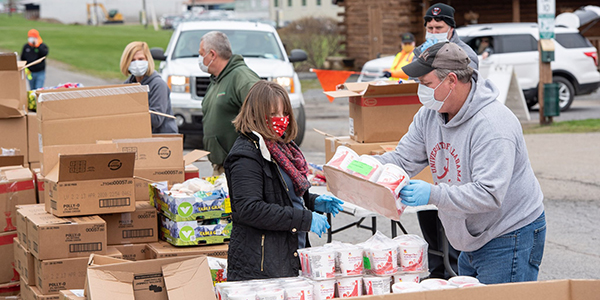Graduate students respond to COVID-19 food insecurity
Three Binghamton University graduate students are working with local agencies to address increased food insecurity resulting from the coronavirus.

During the coronavirus pandemic, several organizations in the greater Binghamton area including Binghamton Food Rescue, the Food Bank of the Southern Tier and the Rural Health Network of South Central New York are working together and implementing new procedures to battle rising food insecurity in the community. Three Binghamton University graduate students are contributing to these efforts.
Eliana Epstein, a second-year master’s student studying sustainable communities, is the director of Binghamton Food Rescue. She said her organization has seen a large increase in the families it serves, from 15 to 20 families per distribution pre-pandemic to upwards of 115 families now.
To adhere to social distancing guidelines, Binghamton Food Rescue practices contactless drop offs and calls recipients instead of knocking or ringing doorbells when making deliveries. Additionally, the organization requires volunteers to sanitize their cars prior to making deliveries, provides volunteers with masks and gloves, encourages frequent hand washing and staggers deliveries to avoid too many volunteers working together at once.
“We have received an outpouring of support from the community,” Epstein said. “Much more social media interaction, donations and kind messages. We are so proud of our community and humbled to be a part of it.”
Second-year master’s student Erica Miner is studying public administration and serves as the programs and partnerships coordinator at the Food Bank of the Southern Tier. She said the organization has, at times, had to change its procedures on an hourly basis to maintain safe operations.
Due to social distancing concerns, Miner said the organization had to cancel all of its mobile pantries — its biggest outlet for providing food. Since then, the Food Bank has started using schools and churches as drop-off points, particularly in Broome County.
The Food Bank sends 600 boxes weekly to the Endwell United Methodist Church for volunteers to pack for pickup at the church and also conducts three-hour-long Community Food Distributions (CFDs) in each county it serves. Clients sign up ahead of time, then simply drive up, pop their trunks and receive one box of perishable food and one box of non-perishable food before driving off.
The Food Bank is also serving more families now than it has in the past.
“Our pantries have been amazing and are continuing to run as normal — some even have increased hours,” Miner said. “They have taken precautions and limited how many volunteers are at each distribution point, but have increased the amount of food given out.”
After serving as an AmeriCorps VISTA member with the Rural Health Network of South Central New York for two years, Tom Lewis is now a staff member. A first-year graduate student studying public administration, he works as the community food coordinator for the organization, which serves 10 counties in the Southern Tier of New York, including Broome. His responsibilities include directing project management, event planning, volunteer recruitment and technical assistance for community food projects across the service area.
Community partnerships have been key to reaching as many families as possible for the network, Lewis said. In Broome County, it has teamed up with the United Way to recruit volunteers to deliver and pack emergency meal kits at the Community Hunger Outreach Warehouse (CHOW). So far, 31 community volunteers have put in 132 hours of service at this hub.
The Rural Health Network also collaborates with the Food Bank of the Southern Tier to register participants and deliver meals.
AmeriCorps members are also assisting partner organizations in Delaware and Tioga counties with food distribution efforts, according to Lewis. Staff members are assisting the Broome County Office for Aging Meals on Wheels program, delivering meals to residents in northern Broome County three days a week.
The Rural Health Network, too, has seen changes in its routine services. Above all, it has seen increased phone contact with “particularly vulnerable rural and elderly clients” who are socially isolated. The organization anticipates serving more people as the pandemic continues, especially among the elderly community.
Donate to Binghamton Food Rescue, Food Bank of the Southern Tier and Rural Health Network.

